Burundian leaders met in Kayanza last weekend. An opportunity to speak freely. But what’s next?
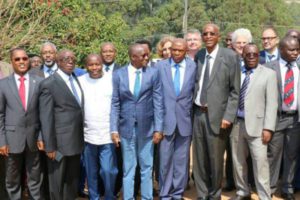
Some political leaders in Kayanza
“The responsibility of political leaders remains committed to warding off the evil through dialogue. This could hamper the decisive march towards the 2020 horizon,” said Burundi First Vice President Gaston Sindimwo.
The success of this retreat organized by the Ombudsman was the diversity of participants. The strong opposition to Bujumbura was present. Kayanza also shone with the richness of these debates. “One could see prominent political figures like Léonce, Rwasa, and Evariste Ndayishimiye freely saying their piece. It was a real debate, “said one participant.
The exchanges focused on the political and security situation of the country and the prospects for the 2020 elections. According to reliable sources, Bujumbura Government wanted everyone’s contribution. The objective was to get a common consent regarding the amendment to the Constitution. The retreat also aimed to get the roadmap for the 2020 elections. “We were asked to start from the 2013 roadmap to amend and transform it for forthcoming elections,” said one participant.
The government in place that is failing to repatriate refugees has adopted another strategy with finess: setting up joint commissions composed of members from the opposition and government to convince the refugees to return.
Kayanza was also designed to bring back the Arusha peace process and send a strong message to the international community that all political forces, even the most influential politicians are in the country, that are only in exile those who are wanted. In short, to suggest that there is no organization abroad that is disputing political seats with others, and finally bring Arusha to an end by proving that all the organizations sharing the political space are in Bujumbura.
At the end of the two-day retreat, no communiqué was issued and no agreement was reached on the main points that have been discussed. Participants agreed on a series of talks initiated in Kayanza to tackle the issues that have remained unresolved.
Reactions
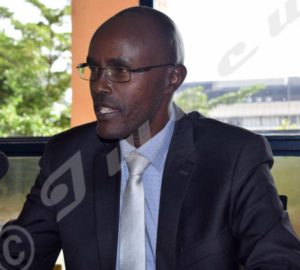 Tatien Sibomana: “The opposition has spoken the same language”
Tatien Sibomana: “The opposition has spoken the same language”
The political actor said he was satisfied. The opposition convinced the organizer and rejected Cndd-Fdd and its acolytes’ claims. “We have presented arguments that are stronger and more sophisticated than those of the ruling party. “Tatien Sibomana speaks of a stormy debate, each speaking in the freest possible way. A meeting that allowed the opposition to unite in front of the same cause to defend. “The opposition spoke the same language.”
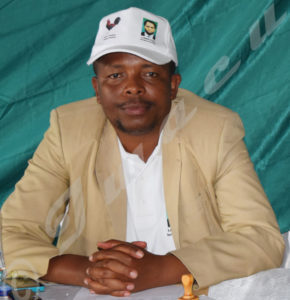 Kefa Nibizi: “The participation of the entire political class”
Kefa Nibizi: “The participation of the entire political class”
The president of Frodebu Nyakuri party, welcomed the participation of the entire political class in its diversity. He said everyone agreed on the elections as the only way to come to power. Kefa Nibizi indicated that concerns about the management of memory had been raised. Painful moments were mentioned “In this connection, we would like the Truth and Reconciliation Commission-CVR to do AND accomplish its work before the 2020 elections.”
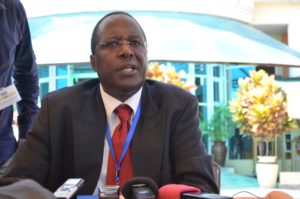 Charles Nditije: “A political swindle”
Charles Nditije: “A political swindle”
The president of the opposition platform-Cnared condemns the meeting of Kayanza. He calls it political manoeuver which tends to show that the politico-security situation is returning to normal. He also says any attempt of dialogue imposed by Cndd-Fdd, which does not fit into the scheme of the inclusive negotiations cannot bring any solution to the current crisis.
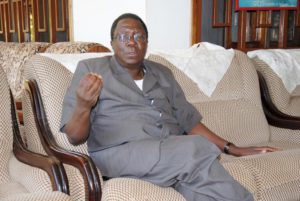 Sylvestre Ntibantunganya: “Moments of discussion to be encouraged”
Sylvestre Ntibantunganya: “Moments of discussion to be encouraged”
The former Burundian Head of State deplores the fact that people try to discourage meetings such as those of Kayanza. According to Sylvestre Ntibantunganya, it is necessary to see them in a positive way. He also encouraged such opportunities to meet and discuss according to the precise objectives to be reached.
Analysis
The disillusion
The approach of the ombudsman, Edouard Nduwimana was well concocted: to convince the strong opposition of Bujumbura to sit at table. The magic of Kayanza has operated. The ruling party was debating with its opponents in Bujumbura.
The ice was broken. The politicians, a little strained, expressed their ideas with excitement. Nobody beat about the bush. Everyone told their opponent what they felt in their heart. If one makes an assessment, the great merit of Kayanza may be that. A real debate as we saw before the crisis of 2015. Some talked of a success on this point where Mkapa-led facilitation has failed during its year of mediation.
In any case, all the stakeholders came out excited. Several have spoken of Kayanza as a successful way to get the country out of the crisis. They have accelerated the process of ongoing dialogue. Despite the lack of conclusion of this session, several disputes were put on the table.
Then, just a few days after the retreat in Kayanza Northern Province, a meeting was organized in Bujumbura that Tuesday by the initiative of the Ministry of the Interior. The opposition, which was not invited, got quickly disappointed, saying it was outsmarted. Some of the opposition members fail to explain how the Ministry of the Interior decided to organize a meeting between Cndd-Fdd and parties close to it without the real opposition. In the end, a ‘resolution’ was issued without consideration of issues raised in the retreat held in Kayanza.
Some analysts even talk about a parallelism between these two meetings. The question was whether the ombudsman was mandated by the party leaders or the Minister of the Interior, Pascal Barandagiye, was a plan B of the government. A way to reach the ultimate goal: the conclusions that give carte blanche to the power in place to proceed with the amendment to the Constitution and give the findings of the National Commission for the Inter Burundian Dialogue a place of honor. A way of rejecting Mkapa-led dialogue.

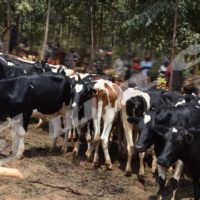
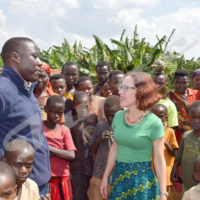













 IWACU Open Data
IWACU Open Data

